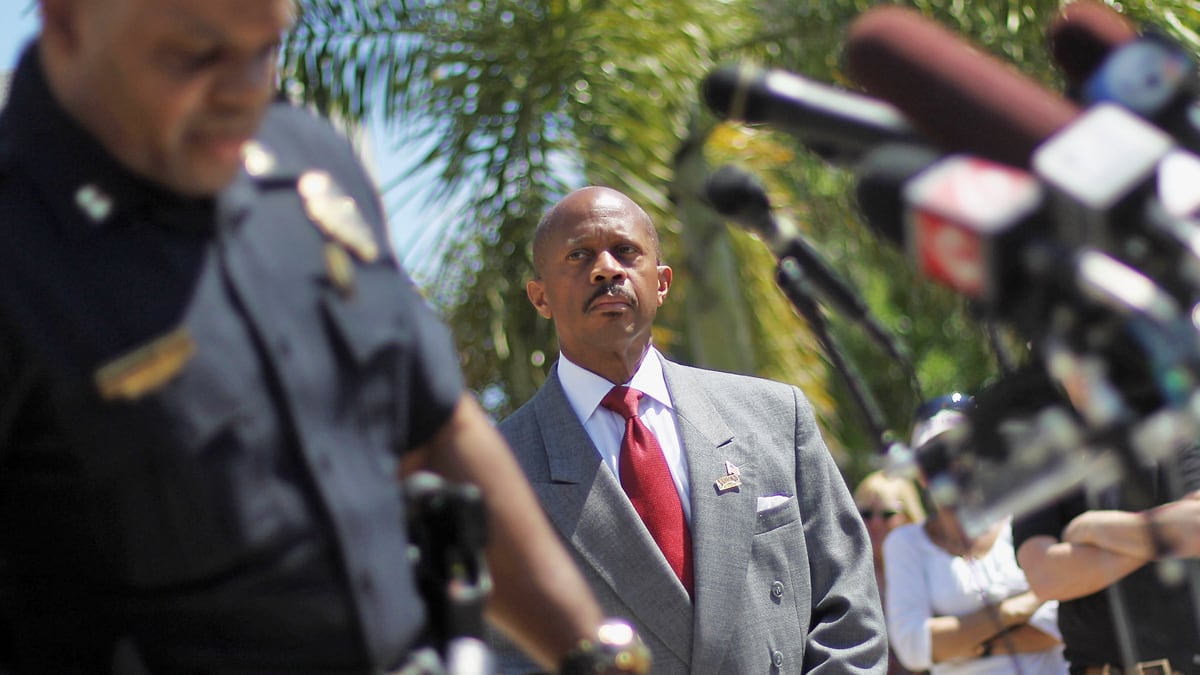It could happen anywhere.
Norton N. Bonaparte, Jr., the first African-American city manager of Sanford, Florida, is a man stuck between a rock and a hard place as he tries to defend the town where Trayvon Martin was gunned down while maintaining his credibility with local residents of color and the national media.

Bonaparte has managed to come off as honest—at least as honest as the manager of a city attempting to dodge a huge civil lawsuit can be—about Sanford’s racial history, and the ugly relationship over the years between the police and the city’s residents of color.
In his first press conference after the killing (on March 22) Bonaparte stated “This is a difficult time for this community, and a very difficult time for out nation … what the city of Sanford wants more than anything else for the Travon Martin family is justice.”
The quandary Norton Bonaparte finds himself in, however, is how to square the historic, allopatric mistreatment of minorities at the hands of police, with his seemingly sincere efforts to allow a through and professional investigation of the Sanford department go forth—an investigation that might prove damning in terms of how the police have long operated in this small Florida city.
In Sanford, it’s an original sin, going back to the town’s founder and namesake, Henry Shelton Sanford.
The Daily Beast’s Michael Daly describes Sanford as “a failed orange grower turned lobbyist who, in the 19th century, abetted a Belgian king’s bloody colonial adventure in the Congo that left millions of Africans dead,” and “an ardent proponent of sending black Americans to Africa.”
Sanford built the town in the 1870s to house workers for the vast citrus groves he’d planted nearby. The scion of a wealthy Connecticut manufacturing family, Sanford served as Abraham Lincoln’s ambassador to Belgium for eight years and became a business associate of the ruthless King Leopold II.
In league with Alabama Senator Tyler Morgan (a former brigadier general in the Confederate Army) he attempted to develop a sort of reverse slave trade scheme to ship former slaves to the Belgium-controlled Congo to work on rubber plantations. Alas, he fared no better in that enterprise than he did in any of the many others he failed at during his lifetime. Now it appears as if his sordid legacy of failure is once again catching up to Henry Sanford.
In 1911 city fathers in Sanford dissolved the charter of the nearby black district known as Goldsboro, but resisted incorporating the residents into the fabric of the community. When Jackie Robinson came to town for spring training as a member of a Brooklyn Dodgers farm team in 1947 white residents got up in arms and ran him out of town. Then there was the bit of nastiness when the city filled its swimming pools with cement rather than integrate them.
Joy-Ann Reid, in an in-depth piece for TheGrio.com, wrote, “The rift between Sanford’s black residents and police didn’t start with Trayvon Martin. Locals tell of former police chief Roy G. Williams, who was chief from the 1920s through the 1960s, and who used to take prisoners from the jail and force them to work on his farm in Georgia. He was eventually jailed for the practice.”
Brian Tooley, who served as chief for 14 years was “forced to retire a month early last January after officers failed to arrest Justin Collison, a police lieutenant’s son who beat up a homeless black man, Sherman Ware, in an incident captured on cellphone video that went viral,” wrote Reid.
The one way out for Bonaparte might be to acknowledge that that indeed Sanford police have been insensitive, to put it kindly, towards minorities—but no more so than in virtually every other police department across the country. Sanford’s original sin is America’s.
“This kind of ‘us versus them’ attitude is not confined to police forces in the south,” said Ken Lumpkin, a Cleveland, OH attorney and former city councilman. “You can find similar behaviors on forces all across the country. And, unfortunately, when you get a cop wannabe like George Zimmerman he’ll think that he can be as brutal on a minority as police historically have been.”
Newly arrived in September, 2011 from previous roles as city manager of Topeka, KS, city administrator of Plainfield, NJ, and city business administrator of Camden, NJ, this is Bonaparte’s first job in a city below the Mason-Dixon line. A graduate of Cornell University’s Graduate School of Business with a Masters in Public Administration, he’s taught public management courses at the graduate level at Rutgers University, served as a principal instructor for the University of Kansas’ Emerging Leaders Academy, and is a fellow of the prestigious National Academy of Public Administration.
With that stellar résumé, the question remains why Bonaparte is allowing former Sanford Chief of Police Bill Lee to offer the defense of the police that leads the city’s web page as of this writing, more than two weeks after Lee was forced to “temporarily” step down, and was replaced by Capt. Darren Scott, the first African-American to lead the department. Capt. Scott, in his first press conference said “… I know that … every one of you out there watching would like to have a quick and positive resolution to this tragic event.” However, an outcome that proves “positive” for one side wouldn’t be viewed as such by the other. Lines have been deeply drawn in the sand.
The Martin episode has the taint of cover up, mendacity, and protecting white privilege, and one has to wonder why Bonaparte is standing behind Lee’s version of events, or if this is an oversight or tactical maneuver.
At a March 27 press conference he did acknowledge the strained relations between the department and the citizenry. “We heard from residents … regarding the concerns they have regarding the police department, so I am in the process of talking with the Department of Justice about instituting a mechanism whereby citizens that have complaints investigated by an independent agency.”
As gun owners nationwide circle the wagons in an attempt to head off any effort to change or repeal Stand Your Ground laws, which have emerged as the firewall standing between this controversy and an honest examination of our wrongheaded gun laws, Lee’s version of the story tends to exculpate Zimmerman from wrongdoing. But even as the local police seem to have dragged their heels on a thorough investigation of the shooting, let alone justice, the truth will eventually emerge now that the feds are also investigating.
We’ll see if Bonaparte will have reason then to regret standing with Sanford.






